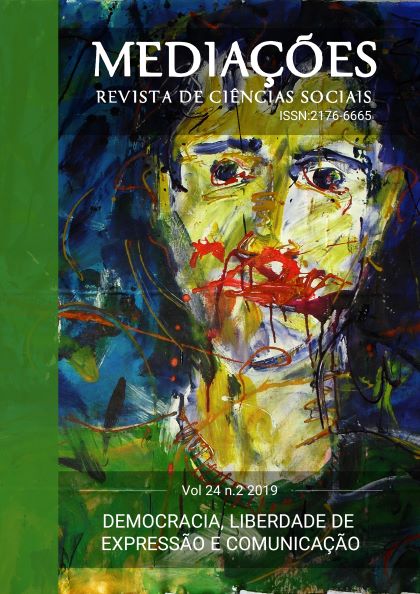Freedom of the press in Benjamin Constant's work: liberal individual right or republican political guarantee?
DOI:
https://doi.org/10.5433/2176-6665.2019v24n2p31Keywords:
Benjamin Constant, Freedom of the press, Liberalism, RepublicanismAbstract
This article investigates the theoretical status of freedom of the press in Benjamin Constant's work, regarding his distinction between principles of liberty and guaranties. The hypothesis is that freedom of the press is a component of the liberty of moderns in which the articulation occurs between the sphere of principles of liberty and that of guaranties. We refer this articulation to the author's effort to integrate two fundamental political languages for the elaboration of his political theory: the republican and the liberal languages. The article reconstructs a theory of freedom of the press developed by the author in a liberal language, which delimits the fields of thought and expression as belonging by right to the individual domain and define this freedom by the non-intervention formula. Then, the article maintains that arguments from a republican language are built alongside this purely liberal justification. These republican arguments comprehend freedom of the press as a fundamental feature of a free constitution, in which the institutional framework and the public spirit oppose the emergence of an arbitrary power. This aspect of Constant's work is studied in order to reassess the normative foundations of freedom of the press and its challenges in modern society.Downloads
References
BIGNOTTO, Newton. República dos antigos, república dos modernos. Revista USP, São Paulo, n. 59, p. 36-45, set./nov. 2003.
CASSIMIRO, Paulo. O império da opinião: espaço público, opinião pública e legitimidade do político no argumento liberal. DADOS - Revista de Ciências Sociais, Rio de Janeiro, v. 61, n. 3, 2018.
CONSTANT, Benjamin. De la religion, considérée dans sa source, ses formes et ses développements. Paris: Firmin Didot, 1824. t. 1.
CONSTANT, Benjamin; HOFMANN, Etienne (org.). Les «Principes de politique» de Benjamin Constant. Genebra: Droz, 1980. t. 2. Texte établi d'après les manuscrits de Lausanne et de Paris avec une introduction et des notes.
CONSTANT, Benjamin; RAYNAUD, Philippe (org.). De la force du gouvernement actuel de la France et de la nécessité de s'y rallier: des réactions politique: des effets de la Terreur. Paris: Flammarion, 1988.
CONSTANT, Benjamin. Fragments d'un ouvrage abandonné sur la possibilité d'une constitution républicaine dans un grand pays. Paris: Aubier, 1991.
CONSTANT, Benjamin. Å’uvres complètes: écrits de jeunesse (1774-1799). Tübingen: Max Niemeyer, 1998. t. 1.
CONSTANT, Benjamin. Å’uvres complètes: principes de politique et autres écrits, juin 1814-juillet 1815. Tübingen: Max Niemeyer, 2001. t. 9.
CONSTANT, Benjamin. Commentaire sur l'ouvrage de Filangieri. Paris: Les Belles Lettres, 2004.
DIJN, Annelien de. French political thought from Montesquieu to Tocqueville: liberty in a levelled society?. Cambridge: Cambridge University Press, 2008.
FONTANA, Biancamaria. Benjamin Constant and the post-revolutionary mind. New Haven, Londres: Yale University Press, 1991.
GAUCHET, Marcel. Benjamin Constant: l'illusion lucide du libéralisme. In: CONSTANT, Benjamin; GAUCHET, Marcel (org.). De la liberté chez les modernes, écrits politiques. Paris: Librairie Générale Française, 1980.
GAUCHET, Marcel. Constant, Staël et la révolution française. In: FURET, François; OZOUF, Mona (org.). The french revolution and the creation of modern political culture: the transformation of political culture 1789-1848. Oxford, Nova York: Pergamon, 1989. v. 3.
HOLMES, Stephen. Benjamin Constant and the making of modern liberalism. New Haven, Londres: Yale University Press, 1984.
JAINCHILL, Andrew. Reimagining politics after the terror: the republican origins of french liberalism. Ithaca, Londres: Cornell University Press, 2008.
JAUME, Lucien. L'individu effacé, ou le paradoxe du libéralisme français. Paris: Fayard, 1997.
JENNINGS, Jeremy. A note on freedom of the press in restoration France. Journal of Modern Italian Studies, [Italia], v. 17, n. 5, p. 568-573, 2012.
KALYVAS, Andreas; KATZNELSON, Ira. Liberal beginnings: making a republic for the moderns. Cambridge: Cambridge University Press, 2008.
KANT, Immanuel. An answer to the question: What is Enlightenment?. UK: Penguin, 2009.
LUTERO, Martinho; CALVINO, João; HÖPFL, Harro (org.). Sobre a autoridade secular: sobre o governo civil. São Paulo: Martins Fontes, 2005.
MANENT, Pierre. Histoire intellectuelle du libéralisme: dix leçons. Paris: Hachette, 1987.
MONTESQUIEU, Charles de Secondat. O espírito das leis. São Paulo: Martins Fontes, 2005.
OZOUF, Mona. "Esprit public". In: FURET, François; OZOUF, Mona (org.). Dictionnaire critique de la révolution française. Paris: Flammarion, 1988.
PETTIT, Philip. Republicanism: a theory of freedom and government. Oxford: Oxford University Press, 1997.
SIEDENTOP, Larry. Two liberal traditions. In: RYAN, Alan (org.). The idea of freedom: essays in honour of Isaiah Berlin. Oxford: Oxford University Press, 1979.
SIEYÈS, Emmanuel-Joseph; FAURÉ, Christine (org.). Des manuscrits de sieyès, 1773-1799. Paris: Honoré Champion, 1999.
SKINNER, Quentin. Visions of politics: regarding method. Cambridge: Cambridge University Press, 2002. v. 1.
SPITZ, Jean-Fabien. Républicanisme et libéralisme dans le moment révolutionnaire. Annales historiques de la Révolution française, Reims, FR, n. 358, p. 19-45, out./dez. 2009.
VINCENT, K. Steven. Benjamin Constant, the french revolution, and the origins of French romantic liberalism. French Historical Studies, Durham, v. 23, n. 4, p. 607-637, 2000.
Downloads
Published
How to Cite
Issue
Section
License
Copyright (c) 2022 Felipe Freller

This work is licensed under a Creative Commons Attribution 4.0 International License.
Copyright on articles published in Mediações belongs to the author(s): in the case of partial or entire republication of the original publication, we ask author(s) to indicate the original publication in the periodical.
Mediações uses the Creative Commons Attribution 4.0 International license, which allows Open Access, enabling any user to read, download, copy and disseminate its content so long as adequately referenced.
The opinions expressed by the author(s) are their sole responsibility.

































